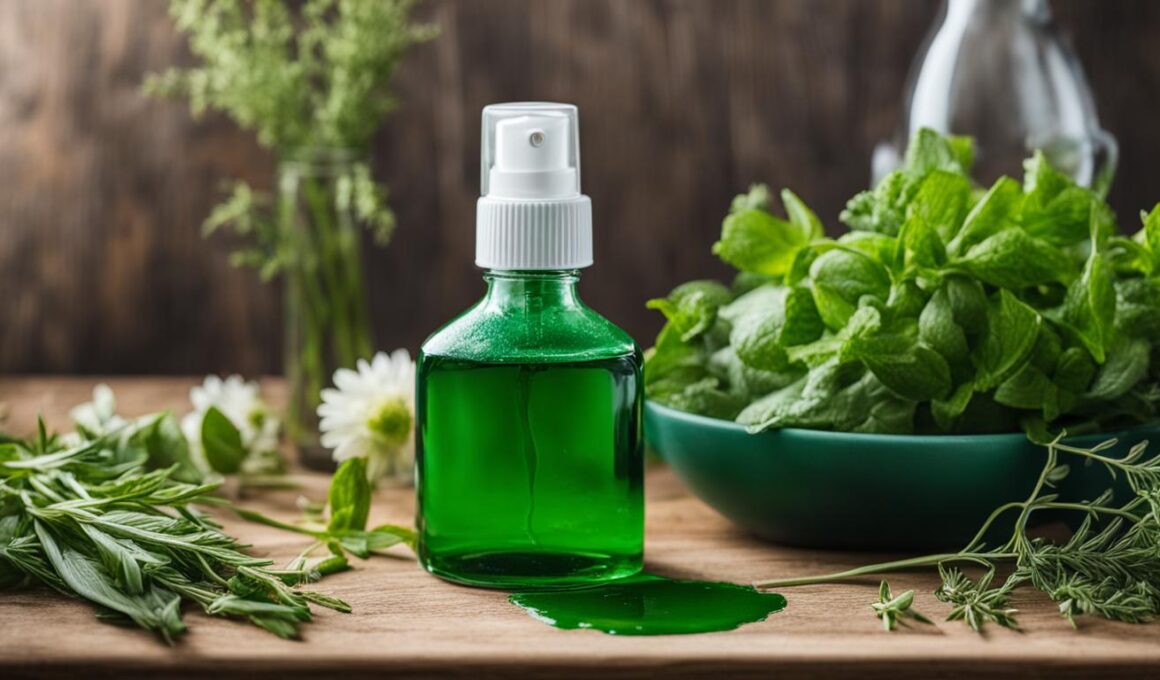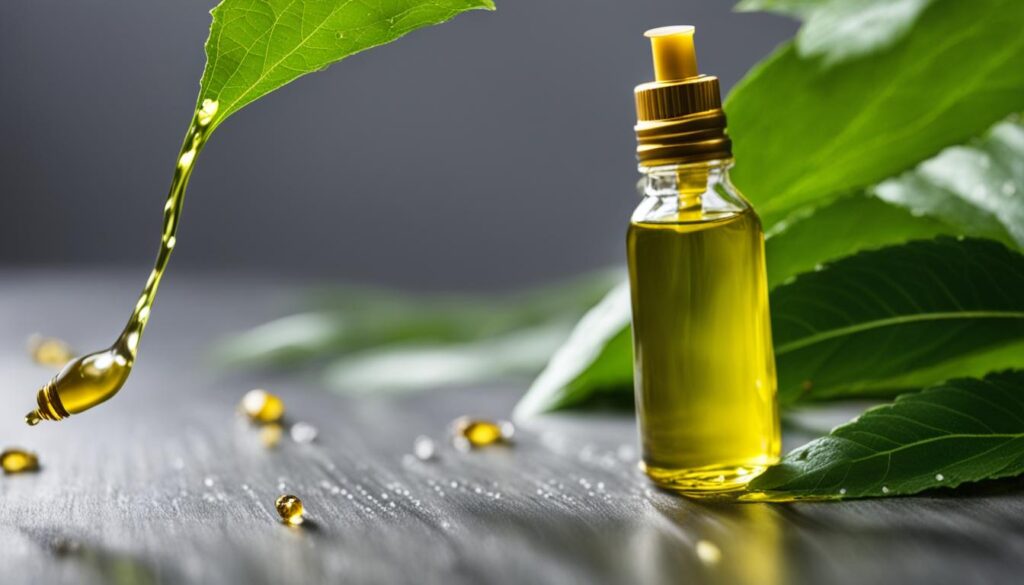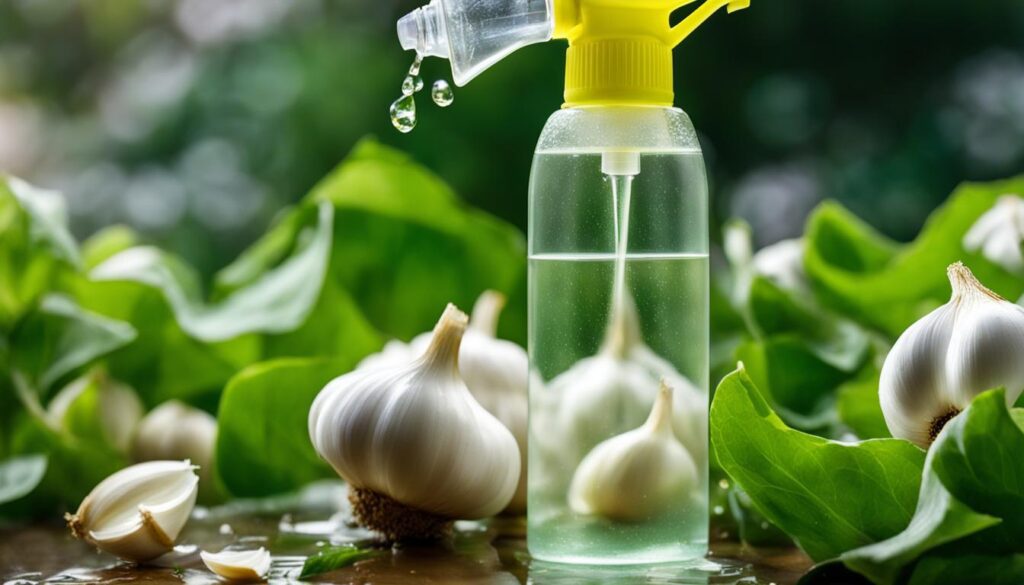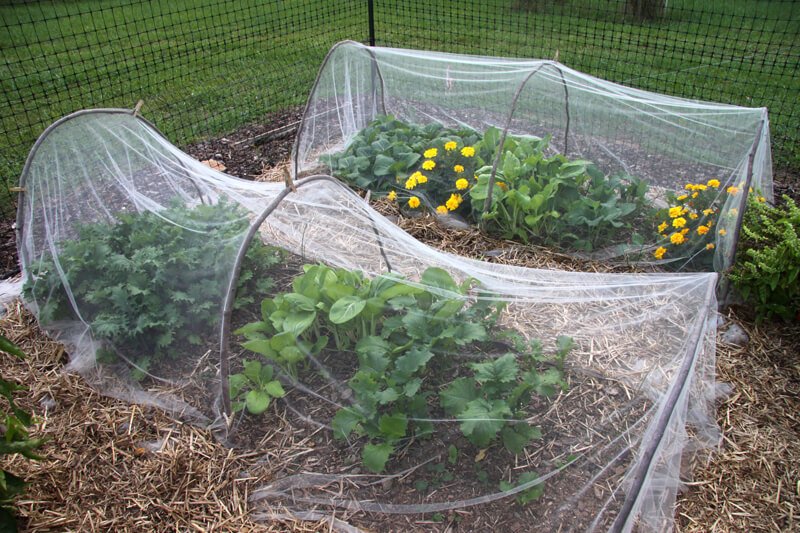Are bugs wreaking havoc on your garden? Don’t worry, we’ve got you covered with this DIY guide on creating homemade plant spray for bugs. Say goodbye to toxic commercial insecticides and hello to natural and affordable solutions.
Using ingredients commonly found in your kitchen, such as garlic, nettle, soap, tomato, basil, and vinegar, you can make effective bug sprays that will keep aphids, mites, thrips, and other common garden pests at bay.
But remember, these homemade sprays are a short-term solution. To maintain a healthy garden, focus on creating a balanced ecosystem by planting companion plants and attracting beneficial insects.
Key Takeaways:
- Homemade plant sprays are a natural and affordable alternative to toxic commercial insecticides.
- Ingredients like garlic, nettle, soap, tomato, basil, and vinegar can be used to create effective bug sprays.
- Use homemade sprays as a short-term solution and focus on creating a balanced garden ecosystem.
- Plant companion plants and attract beneficial insects to help control pests in the long run.
- Patch-test any spray before applying it to the entire plant to ensure compatibility.
Homemade Insecticidal Soap
Insecticidal soap is a versatile and effective homemade bug spray that can be made using simple ingredients you likely already have in your kitchen. This natural solution is particularly useful in controlling pests such as aphids, lacebugs, leafhoppers, mealybugs, and thrips. By creating your own homemade insecticidal soap, you can take control of garden pests without relying on harmful chemical-based insecticides.
To make your own insecticidal soap, combine one cup of vegetable oil with one tablespoon of dishwashing soap or pure Castile liquid soap. This mixture should be diluted with warm water and transferred to a spray bottle for easy application. Before applying the spray to your plants, it is recommended to do a patch test on a small portion of the plant to ensure it doesn’t cause any adverse effects. Once you’ve confirmed the spray is safe, apply it to the affected plants, making sure to target the pests directly.
Insecticidal soap should be used as a concentrate and applied every few days or as needed until the pests are under control. Regular monitoring of your plants is important to catch any new infestations early on. Remember, homemade insecticidal soap is a short-term solution and should be used in conjunction with other practices such as companion planting and attracting beneficial insects to maintain a healthy garden ecosystem.
Take a look at the table below for a quick summary of homemade insecticidal soap:
| Ingredient | Quantity |
|---|---|
| Vegetable oil | 1 cup |
| Dishwashing soap or pure Castile liquid soap | 1 tablespoon |
| Warm water | Dilute as needed |
Remember, maintaining a healthy and balanced garden is key to preventing pest infestations. Use homemade insecticidal soap as a targeted solution for immediate control, while also implementing other natural pest management practices.
A Quick Summary of Homemade Insecticidal Soap:
- Effective against aphids, lacebugs, leafhoppers, mealybugs, and thrips
- Ingredients: vegetable oil, dishwashing soap or pure Castile liquid soap
- Apply as a concentrate every few days or as needed
- Do a patch test before applying to the entire plant
- Use in conjunction with other pest management practices
Neem Oil Bug Spray
Neem oil is a powerful organic insecticide that can effectively control a wide range of common garden pests such as mites, whitefly, aphids, thrips, and powdery mildew. This natural insecticide has been used for thousands of years in India and is now gaining popularity for its effectiveness and eco-friendly properties.
To make a neem oil bug spray, simply mix one to two tablespoons of pure, cold-pressed neem oil with a gallon of water. Adding a teaspoon of dish soap can help the neem oil adhere to the plants. The mixture should be well-mixed and applied to the tops and undersides of the plant’s leaves using a spray bottle. It is important to thoroughly coat the plants for maximum effectiveness.
One of the key advantages of neem oil bug spray is its safety for birds, pets, and beneficial insects. Neem oil is absorbed into the plant’s tissue, making it an internal pest deterrent. It only affects insects that ingest the plant, leaving beneficial insects unharmed. This makes neem oil an ideal choice for those looking for an organic and sustainable insecticide.
| Pests | Application | Frequency |
|---|---|---|
| Mites | Apply directly to affected areas | Once a week or as needed |
| Whitefly | Thoroughly coat leaves | Once a week or as needed |
| Aphids | Apply to affected plants | Once a week or as needed |
| Thrips | Spray all parts of the plant | Once a week or as needed |
| Powdery Mildew | Thoroughly coat leaves | Once a week or as needed |
When using neem oil bug spray, it is important to follow the instructions carefully and avoid spraying during the hottest part of the day to prevent leaf burn. Additionally, it is recommended to conduct a patch-test on a small portion of the plant before applying the spray to the entire plant to ensure no adverse reactions occur. Neem oil bug spray is an effective and safe solution for controlling garden pests while maintaining a healthy and sustainable garden.
References:
– “Natural Garden Pest Control: Neem Oil Spray.” Old Farmer’s Almanac.
– “Neem Oil Insecticide: What Is It, And How To Use Neem Oil On Plants.” Gardening Know How.
– “Neem Oil and Its Uses in Organic Farming.” Centre for Agriculture and Biosciences International (CABI).
Vinegar Spray
If you’re looking for a natural and effective bug repellent, look no further than vinegar spray. This homemade plant spray is made of white vinegar, which contains acetic acid that acts as a deterrent against garden pests. Vinegar spray can be easily made by mixing one cup of white vinegar with three cups of water and adding half a teaspoon of dishwashing soap. The dishwashing soap helps the vinegar adhere to the plants and makes the spray more effective. This simple mixture can be applied directly to the affected areas of your plants to control infestations and keep your garden pest-free.
“Vinegar spray is a safe and natural way to eliminate garden pests and keep your plants healthy.”
– Gardening Expert
Vinegar spray is particularly effective against certain garden pests such as ants, aphids, and whiteflies. The strong odor of vinegar acts as a bug repellent and can help deter these pests from infesting your plants. It’s important to spray the solution under the leaves if you’re dealing with whitefly eggs, as they are commonly found on the undersides of leaves. Additionally, you can add essential oils or lemon peel to the vinegar spray to help mask the strong vinegar smell and make it more pleasant for you and your garden.
| Pests | Method of Application |
|---|---|
| Aphids | Apply vinegar spray directly to affected areas of the plant. |
| Ants | Spray vinegar spray around the perimeter of your garden to create a barrier. |
| Whiteflies | Apply vinegar spray under the leaves where whitefly eggs are commonly found. |
Vinegar spray is a natural and affordable alternative to chemical insecticides. It is important to note that vinegar spray requires direct contact with the pests to be effective, so make sure to thoroughly spray the affected areas. Remember to avoid spraying during the hottest part of the day to prevent leaf burn and to patch-test the spray on a small portion of the plant before applying it to the entire plant. With vinegar spray, you can protect your garden from garden pests and keep your plants thriving.
Garlic Spray
Garlic spray is a powerful homemade solution that can effectively repel aphids, slugs, and carrot fly in your garden. To make garlic spray, you’ll need two garlic bulbs, vegetable oil, mild liquid soap, and water. Begin by pureeing the garlic bulbs with one tablespoon of vegetable oil. Let the mixture sit overnight, then strain it and add one teaspoon of mild liquid soap and four cups of water. Store the garlic spray in the refrigerator until needed.
To apply the garlic spray, wait until evening when the weather is cooler. Apply the spray to the leaves of the affected plants, making sure to cover both the tops and undersides of the leaves. Reapply every few days if dealing with a severe infestation, or use it as a deterrent once every one to two weeks. Garlic spray is a natural and affordable alternative to chemical insecticides, helping you maintain a healthy and pest-free garden.
| Pest | Effectiveness |
|---|---|
| Aphids | Highly effective |
| Slugs | Effective |
| Carrot Fly | Effective |
Garlic spray works by releasing a strong odor that repels pests, making your plants less appealing to aphids, slugs, and carrot fly. It is important to note that garlic spray may have a strong smell, so avoid applying it near outdoor seating areas or where the smell could be bothersome. Additionally, always patch-test the spray on a small portion of the plant before applying it to the entire plant to ensure it does not cause any damage.
By using garlic spray as part of your pest control routine, you can protect your garden from infestations without the need for harsh chemicals. It is a safe and natural method that helps maintain a healthy and thriving garden ecosystem.
Tomato Leaf Spray
Tomato leaf spray is a natural and effective homemade insecticide that can be easily made using tomato plants. The leaves of tomato plants contain alkaloids, which are toxic to aphids and mites, making this spray a great solution for controlling infestations in your garden.
To make tomato leaf spray, start by chopping up tomato leaves and placing them in a container filled with water. Let the mixture steep overnight to allow the alkaloids to be extracted from the leaves. After steeping, strain the mixture into a spray bottle.
To apply the spray, simply mist it onto the leaves of your tomato plants, focusing on areas where aphids and mites are present. The alkaloids in the spray will deter and kill these pests, helping to protect your plants from damage.
Cinnamon Spray
Cinnamon spray is not only a delicious addition to your baked goods, but it can also be used as a natural insecticide and a way to control mushrooms in your garden. Made from simple ingredients like cinnamon powder and warm water, this homemade spray is an effective and affordable option for pest control.
To make cinnamon spray, mix two teaspoons of cinnamon powder with four cups of warm water. Let the mixture steep overnight, and then strain it into a spray bottle. The strong scent of cinnamon acts as a natural repellent, deterring ants and other insects from your plants. By misting the potting soil and plants with cinnamon spray, you can create a barrier that prevents mushroom growth and keeps unwanted pests at bay.
“Using cinnamon spray in your garden is a safe and natural way to control pests and prevent mushroom growth.”
When working with cinnamon spray, it is important to wear gloves to avoid direct contact with your skin. Additionally, be cautious not to spray cinnamon in your eyes, nose, or mouth, as it can cause irritation. Follow the instructions carefully and apply the spray as needed to ensure the best results.
| Benefits of Cinnamon Spray | Uses |
|---|---|
| 1. Natural insecticide | 1. Garden pest control |
| 2. Mushroom control | 2. Anti-ant barrier |
Using cinnamon spray in your garden is a safe and natural way to control pests and prevent mushroom growth. Give it a try and enjoy a thriving garden without the need for harsh chemicals!
What Ingredients Can I Use to Create a Homemade Plant Spray for Bugs?
Creating effective garden bug sprays at home is easy with common ingredients. Mix water, dish soap, and neem oil for a natural pesticide. Another option is a mixture of water, garlic, and cayenne pepper. Both sprays can help deter unwanted pests from your plants while being safe for your garden.
Conclusion
Creating homemade plant sprays for bugs is a natural and affordable way to protect your garden from insect pests. By using ingredients like homemade insecticidal soap, neem oil, vinegar, garlic, tomato leaf, and cinnamon, you can effectively control a wide range of pests without resorting to toxic chemicals.
It is important to use these homemade sprays as a short-term solution and to focus on creating a balanced garden ecosystem by planting companion plants and attracting beneficial insects. Remember to always patch-test the sprays before applying them to the entire plant and to avoid spraying during the hot part of the day to prevent leaf burn.
With homemade plant sprays, you can secure your garden’s health naturally and affordably.
FAQ
Can I use homemade plant sprays as a long-term solution for insect pest control?
No, homemade plant sprays should be used as a short-term solution. It is important to focus on creating a balanced garden ecosystem by planting companion plants and attracting beneficial insects.
How often should I apply homemade insecticidal soap?
Insecticidal soap should be applied every few days or as needed. It is important to patch-test the spray on a small portion of the plant before applying it to the whole plant.
Is neem oil safe for birds, pets, and beneficial insects?
Yes, neem oil is safe for birds, pets, and beneficial insects because it is absorbed into the plant’s tissue and only affects insects that ingest the plant.
How does vinegar spray work as a bug repellent?
The acetic acid in vinegar acts as a bug repellent and can treat infestations. However, vinegar spray requires contact with the pests to be effective.
How often should I apply garlic spray?
Garlic spray should be applied every few days for infestation or as a deterrent every one to two weeks.
Can tomato leaf spray be used on plants other than tomato plants?
No, tomato leaf spray should only be used on tomato plants and should not be used on other nightshade plants.
How does cinnamon spray repel ants?
Cinnamon spray creates an effective barrier against ants and can be misted on the potting soil and plants to control mushrooms and repel ants.












